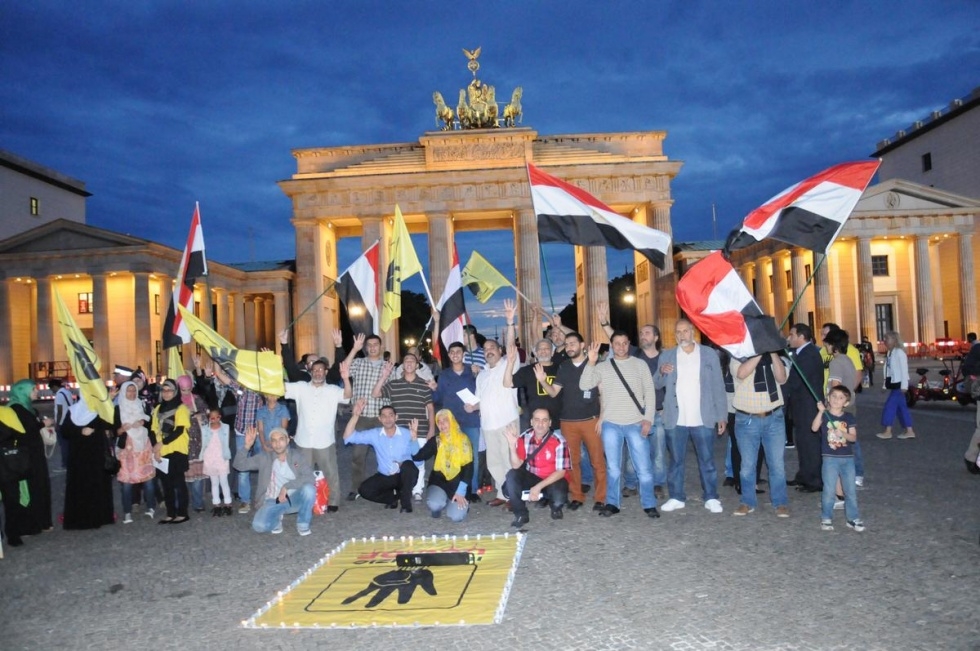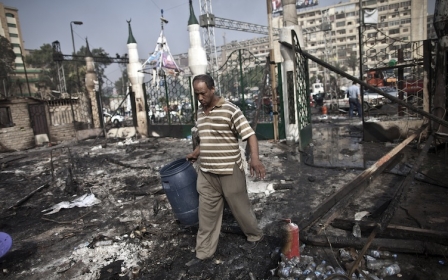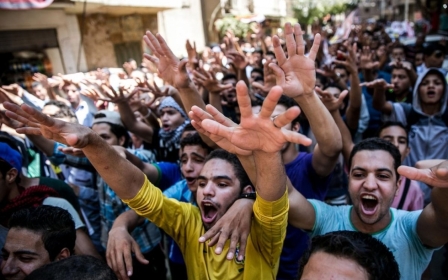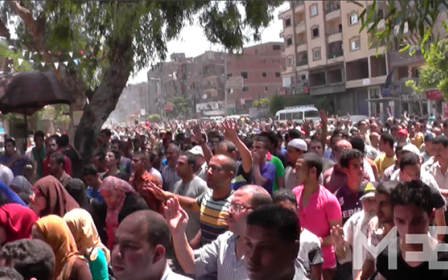Crowds mark Rabaa killings in Washington and Paris

WASHINGTON DC/PARIS - Demonstrators took to the streets of Washington D.C. and Paris on Thursday to mark the first anniversary of the Rabba killings of Egyptian protesters.
Hundreds of Egyptians were killed by security forces who moved in to break up sit-in protests in Cairo's Rabaa al-Adawiya Square and Nahda Square in Giza on 14 August last year.
They were protesting against the removal of President Mohamed Morsi by the military last summer. Former army chief Abdel Fattah al-Sisi, widely seen as the architect of Morsi’s ousting and subsequent imprisonment, won this year’s presidential election.
Gathering at Franklin Square, hundreds of Washington protesters re-enacted the events of last year in 'bloodstained' clothing.
Eighteen-year-old Atiyya, who was present in Rabba Square when the security forces began firing, said: "It was really unbelievable to see people with me, my brothers and sisters, actually being killed next to me."
She added: "My friends were locked up in a mosque and one of my friends called me saying she could not find her siblings and she didn't know where they might be."
Ashraf Atiyyah, an Egyptian professor at New York State University, said he had come to Washington to stand for democracy and the dignity of Egyptians.
He said: "Morsi was elected for three years and he should have finished his term of office regardless of his policies.
"We are trying to create awareness among American people. We have been talking to politicians here and coordinating with people and groups who hold events all over the world."
Sameh El Hannawy, president of Egyptian Americans for Democracy and Human Rights, said he had been in Egypt when former dictator Hosni Mubarak was deposed, as well as when Morsi was ousted from power.
He said: "I decided to go back to Egypt on 30 June [2013] to voice my opinion and stand for the first elected president, Mohamed Morsi. Even if I disagreed with Morsi, I would not disagree with the procedures of democracy."
In Paris, protesters gathered in Place de la Republic chanting slogans "Sisi dictator," "Down with the coup," and "Morsi will be back."
Zanati Abu Hsin, general secretary of the Union for Democracy, said: "We don't forget our martyrs and what Sisi and his followers did to our county.
"President Morsi will be back and those who supported the injustice of the military coup will regret it."
Rabaa, meaning four or fourth in Arabic, has become the sign of anti-coup protests in Egypt. Just a few hours before the massacre on 14 August, protesters began raising four fingers in defiance.
A Human Rights Watch report released Tuesday accused Egyptian security forces of the "systematic" killing of 1,150 demonstrators. It said a minimum of 817 demonstrators were killed in Rabaa and 87 in Nahda.
The watchdog suggested that al-Sisi and Interior Minister Mohamed Ibrahim should be investigated for their roles in the "largest killing of demonstrators in a single day in recent history."
The Egyptian government denounced the report as politicised and biased.
New MEE newsletter: Jerusalem Dispatch
Sign up to get the latest insights and analysis on Israel-Palestine, alongside Turkey Unpacked and other MEE newsletters
Middle East Eye delivers independent and unrivalled coverage and analysis of the Middle East, North Africa and beyond. To learn more about republishing this content and the associated fees, please fill out this form. More about MEE can be found here.




